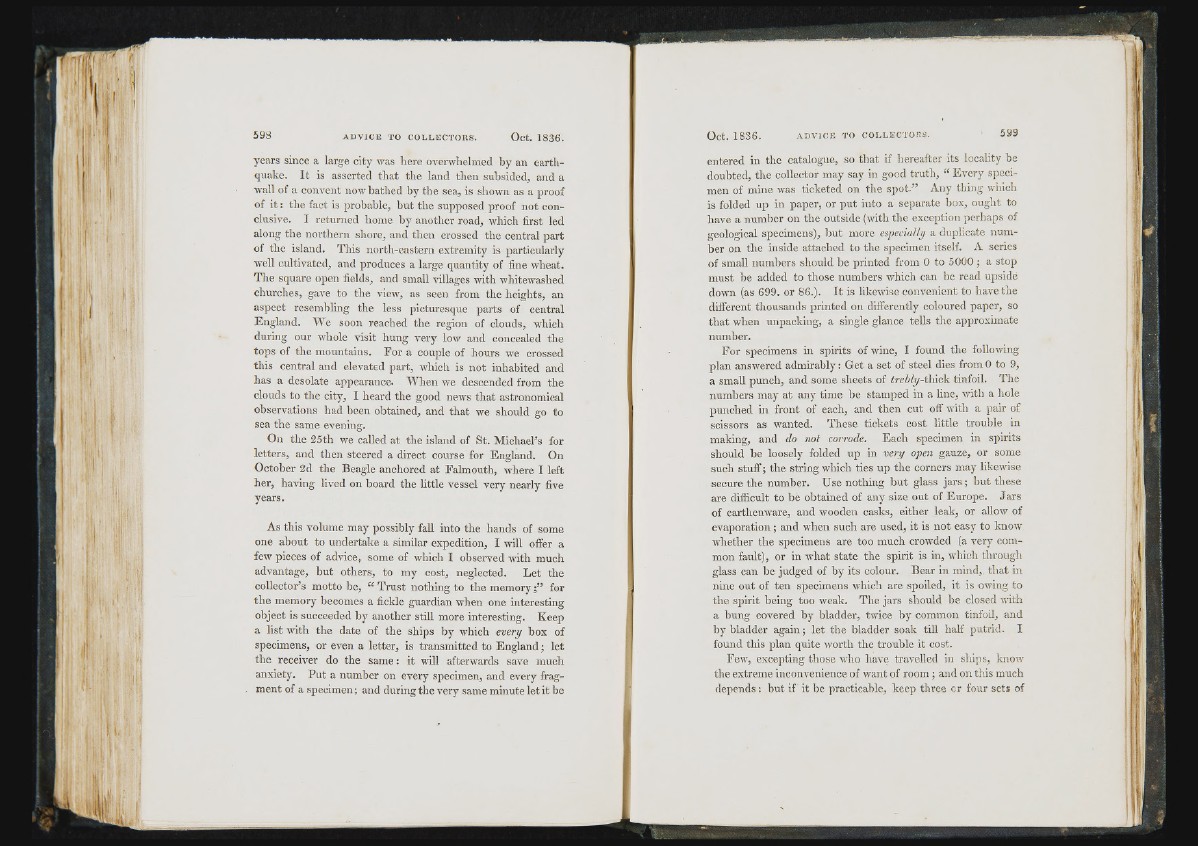
W i
'17 IJ'I
'rriiJ
7 7 ' ' .riif
I
ADV I CE TO COLLECTORS. Oct. 1836.
years since a large city was here overwhelmed by an earthquake.
It is asserted that the land then subsided, and a
wall of a convent now bathed by the sea, is shown as a proof
of i t : the fact is probable, but the supposed proof not conclusive.
I returned home by another road, which first led
along the northern shore, and then crossed the central part
of the island. This north-eastern extremity is particularly
well cultivated, and produces a large quantity of fine wheat.
The square open fields, and small villages with whitewashed
churches, gave to the view, as seen from the heights, an
aspect resembling the less picturesque parts of central
England. We soon reached the region of clouds, which
during our whole visit hung very low and concealed the
tops of the mountains. For a couple of hours we crossed
this central and elevated part, which is not inhabited and
has a desolate appearance. When we descended from the
clouds to the city, I heard the good news that astronomical
observations had been obtained, and that we should go to
sea the same evening.
On the 25th we called at the island of St. Michael’s for
letters, and then steered a direct course for England. On
October 2d the Beagle anchored at Falmouth, where I left
her, having lived on board the little vessel very nearly five
years.
As this volume may possibly fall into the hands of some
one about to undertake a similar expedition, I will offer a
few pieces of adifice, some of which I observed with much
advantage, but others, to my cost, neglected. Let the
collector’s motto be, “ Trust nothing to the memo r y f o r
the memory becomes a fickle guardian when one interesting
object is succeeded by another stiU more interesting. Keep
a list with the date of the ships by which every box of
specimens, or even a letter, is transmitted to England; let
the receiver do the same: it will afterwards save much
anxiety. Put a number on every specimen, and every fragment
of a specimen; and during the very same minute let it be
i
Oct. 1836.
entered in the catalogue, so that if hereafter its locality be
doubted, the collector may say in good truth, “ Every specimen
of mine was ticketed on the spot.” Any thing whioh
is folded up in paper, or put into a separate box, ought to
have a number on the outside (with the exception perhaps of
geological specimens), but more especially a duplicate number
on the inside attached to the specimen itself. A series
of small numbers should be printed from 0 to 5000 ; a stop
must be added to those numbers which can be read upside
down (as 699. or 86.). It is likewise convenient to have the
different thousands printed on differently coloured paper, so
that when unpacking, a single glance tells the approximate
number.
For specimens in spirits of wine, I found the following
plan answered admirably: Get a set of steel dies from 0 to 9,
a small punch, and some sheets of trebly-tlach tinfoil. The
numbers may at any time be stamped in a line, with a hole
punched in front of each, and then cut off with a pair of
scissors as wanted. These tickets cost little trouble in
making, and do not corrode. Each specimen in spirits
should be loosely folded up in very open gauze, or some
such stuff; the string which ties up the corners may likewise
secure the number. Use nothing but glass jars; but these
are difficult to be obtained of any size out of Europe. Jars
of earthenware, and wooden casks, either leak, or allow of
evaporation; and when such are used, it is not easy to know
whether the specimens are too much crowded (a very common
fault), or in what state the spirit is in, which through
glass can be judged of by its colour. Bear in mind,, that in
nine out of ten specimens which are spoiled, it is owing to
the spirit being too weak. The jars should be closed with
a bung covered by bladder, twice by common tinfoil, and
by bladder again; let the bladder soak till half putrid. I
found this plan quite worth the trouble it cost.
Few, excepting those who have travelled in ships, know
the extreme inconvenience of want of room; and on this much
depends: hut if it be practicable, keep three or four sets of
I